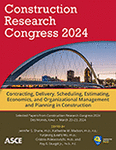Identifying the Job Characteristics Affecting Construction Firm Employee Turnover Intention
Publication: Construction Research Congress 2024
ABSTRACT
Researchers have proved that employees who have the intention to quit the organization, called turnover intention, have decreased productivity and may not fulfill their duties properly. The turnover intention has a negative relationship with the quality of core job characteristics of the organization. As the construction industry has distinctive characteristics compared to other industries, the job characteristics that influence turnover intention need to be explored separately. This study identifies job characteristics of the construction industry that can affect turnover intention. Through the literature review, autonomy, task identity, required skill variety, task significance, justification in assigning work location, and job security are identified as core job characteristics. Based on that, this study suggests a survey evaluating the organization’s level of these job characteristics and turnover intention. The results showed that skill variety and justification in assigning work location are significant predictors of turnover intention. This study contributes to the understanding of the relationship between the independent variables, including the quality of job characteristics and demographics, and the dependent variable, turnover intention. Also, the suggested survey will be conducive for human resource practitioners who want to proactively identify and address employees with a high possibility of turnover.
Get full access to this article
View all available purchase options and get full access to this chapter.
REFERENCES
Bakker, A. B., and E. Demerouti. 2017. “Job demands–resources theory: Taking stock and looking forward.” Journal of Occupational Health Psychology 22 (3), 273.
Bothma, C. F., and G. Roodt. 2013. “The validation of the turnover intention scale.” SA Journal of Human Resource Management 11 (1), 1–12.
Bowen, P., P. Edwards, H. Lingard, and K. Cattell. 2014. “Predictive modeling of workplace stress among construction professionals.” J. Constr. Eng. Manage. https://doi.org/10.1061/(ASCE)CO.1943-7862.0000806, 04013055.
Bureau of Labor Statistics, US Department of Labor. 2023. “Construction managers.” Occupational Outlook Handbook, Accessed April 22, 2023. https://www.bls.gov/ooh/management/construction-managers.htm.
Folger, R., and M. A. Konovsky. 1989. “Effects of procedural and distributive justice on reactions to pay raise decisions.” Academy of Management Journal 32, 115–130.
Fung, I. W., and V. W. Tam. 2013. “Occupational health and safety of older construction workers (aged 55 or above): Their difficulties, needs, behaviour and suitability.” Int. J. Construct. Manage. 13 (3), 15–34.
Griffin, R. W. 1991. “Effects of work redesign on employee perceptions, attitudes, and behaviors: A long-term investigation.” Academy of management Journal 34 (2), 425–435.
Hackman, J. R., and G. R. Oldham. 1975. “Development of the job diagnostic survey.” Journal of Applied Psychology 60 (2), 159–170.
Hackman, J. R., and G. R. Oldham. 1980. Work redesign. Reading, MA: Addison Wesley.
Hovnanian, G., R. Luby, and S. Peloquin. 2022. “Bridging the labor mismatch in US construction.” McKinsey & Company, Accessed April 22, 2023. https://www.mckinsey.com/capabilities/operations/our-insights/bridging-the-labor-mismatch-in-us-construction#.
Konovsky, M. A. 2000. “Understanding procedural justice and its impact on business organizations.” Journal of Management. 26, 489–512.
Leung, M., and H. K. L. Chan. 2007. “Antecedents of commitment in construction management.” Construct. Manage. Econ. 25 (2), 113–127.
Ling, F. Y. Y., and C. M. C. Loo. 2015. “Characteristics of jobs and jobholders that affect job satisfaction and work performance of project managers.” J. Manage. Eng. https://doi.org/10.1061/(ASCE)ME.1943-5479.0000247, 04014039.
Lingard, H. 2003. “The impact of individual and job characteristics on 'burnout’ among civil engineers in Australia and the implications for employee turnover.” Construct. Manage. Econ. 21 (1), 69–80.
Lingard, H., and V. Francis. 2004. “The work-life experiences of office and site-based employees in the Australian construction industry.” Construct. Manage. Econ. 22 (9), 991–1002.
Loewenthal, K. M. 2001. An introduction to psychological tests and scales, Hove, England: Psychology Press.
Perrenoud, A. J., B. F. Bigelow, and E. M. Perkins. 2020. “Advancing women in construction: Gender differences in attraction and retention factors with managers in the electrical construction industry.” J. Manage. Eng. 36 (5), 04020043.
Welfare, K., F. Sherratt, and M. Hallowell. 2021. “Perceptions of Construction work: views to consider to improve employee recruitment and retention.” J. Constr. Eng. Manage. 147 (7), 04021053.
Information & Authors
Information
Published In
History
Published online: Mar 18, 2024
Authors
Metrics & Citations
Metrics
Citations
Download citation
If you have the appropriate software installed, you can download article citation data to the citation manager of your choice. Simply select your manager software from the list below and click Download.
